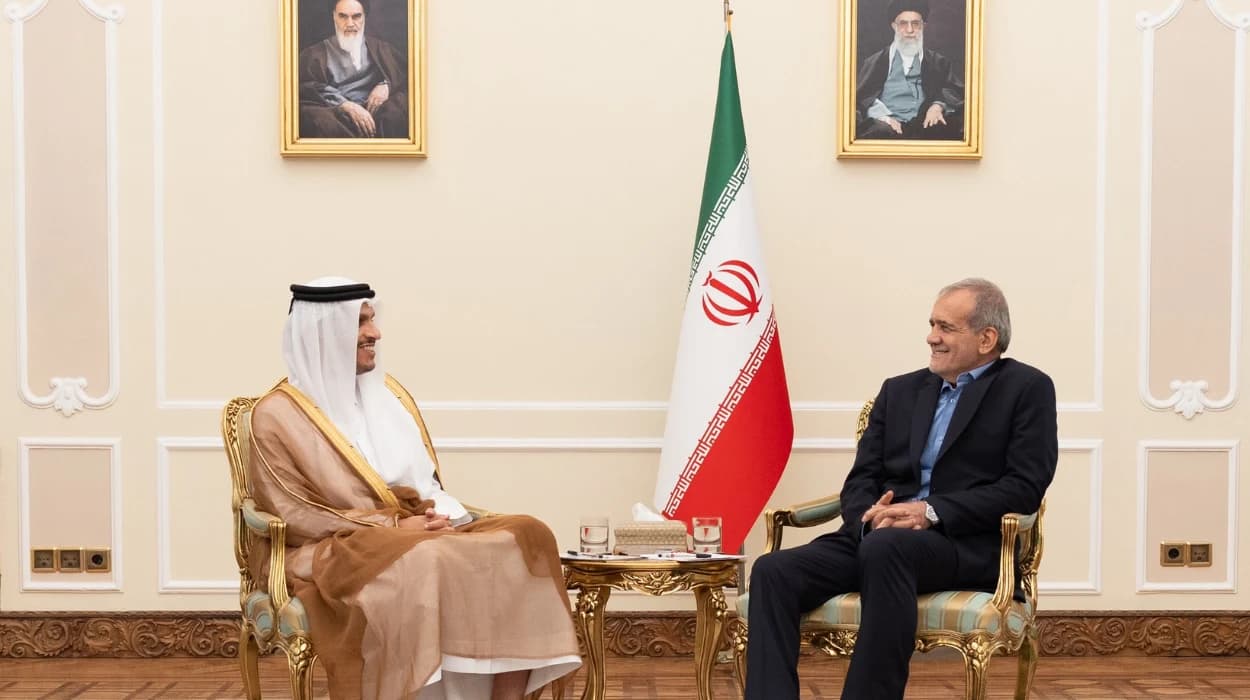Iran strongly condemned Israel’s airstrike on Hamas
headquarters in Doha, Qatar, calling for unified Muslim action to confront
Israeli aggression and protect regional security. Iranian leaders including
President Masoud Pezeshkian, Foreign Minister Abbas Araghchi, and SNSC
Secretary Ali Larijani highlighted the attack as a reckless violation of
international law, urging coordination among Muslim countries and international
institutions to prevent further escalation.
Iran Condemns Israeli Airstrike on Qatar
As reported by Abbas Araghchi, Iranian Foreign Minister, on
X (formerly Twitter), Iran condemned the Israeli regime's recent airstrike on
Qatari soil, describing it as an illegal act targeting Hamas leaders and
civilians. The strike, which took place in Doha, killed several Hamas officials
along with civilians and a Qatari security official. Araghchi emphasised Iran’s
solidarity with Qatar and Palestinians, saying:
“Israel has heinously done what Iran would never contemplate: attacking the dear People and Government of Qatar.”
Araghchi called on the Muslim world to act decisively in
unison against Israel’s “looming hegemony” and stated Iran’s readiness to
deepen cooperation to confront threats to international peace and security.
Similarly, Ali Larijani, Secretary of Iran’s Supreme
National Security Council, posted on X a strong warning that the attack
signalled Israel's intent to dominate the region, writing:
“The Zionist entity's latest crime message in Qatar: O countries of the region! Prepare yourselves for my looming hegemony!!”
Hamas described the strike as a “heinous crime” and
violation of international law. Although senior negotiators survived, five
members of Hamas were killed in the attack. Qatar’s Foreign Ministry denounced
the “cowardly Israeli attack” as a violation of international law and a direct
threat to Qatar’s sovereignty and security.
Iranian President Pezeshkian Calls for United Muslim Stance
Iranian President Masoud Pezeshkian conveyed his
condemnation of the strike in a phone conversation with Qatar’s Emir Sheikh
Tamim bin Hamad Al Thani. According to reports by İlke Haber Ajansı (ILKHA) and
Tasnim News Agency journalist coverage, Pezeshkian reaffirmed Iran’s full
solidarity with Qatar and vowed to support its close neighbour against
“reckless” Israeli aggression.
Pezeshkian stated:
“The Islamic Republic of Iran stands alongside its brothers in Qatar and will take any necessary step to support its close neighbor and friend.”
He criticised Israel for destabilising the broader region
under the pretext of self-defence and urged Muslim nations to adopt a united
and practical stance against Israeli regime crimes, calling for consistent
condemnation to prevent future attacks. He further highlighted that:
“Israel respects no international norms or legal frameworks, and its actions continue only because of American backing.”
Sheikh Tamim expressed appreciation for Iran’s solidarity
and echoed concerns about Israeli Prime Minister Benjamin Netanyahu’s unchecked
aggression. The Emir disclosed that the Hamas officials were reviewing a U.S.
ceasefire proposal when the Israeli strike abruptly targeted the meeting,
undermining diplomatic efforts.
Call to Action for Regional and International Response
President Pezeshkian urged international organisations like
the United Nations and the Organisation of Islamic Cooperation to issue
immediate and firm responses to deter further Israeli aggression. He labelled
the strike as “illegal, anti-human and anti-peace,” emphasising that lasting
peace would only come through ending occupation and aggression.
This call was echoed across Iranian official statements and
widely reported by Tasnim and Nour News agencies. Pezeshkian’s remarks warn of
a broader regional destabilisation if Israel’s actions are left unchecked and
highlighted the destruction of diplomatic opportunities through such violent
means.
Broader Context of Israeli Operations and Regional
Implications
The airstrike on Qatar represents a significant escalation
in Israel’s military campaign against Hamas, formerly limited largely to Gaza
and bordering territories. According to analysis in Tehran Times by journalist
coverage, the attack came amid ongoing targeted assassinations of Hamas
leadership, regional strikes against Iran-aligned entities, and widening
conflicts involving Lebanon, Syria, and Yemen.
Israel’s expanding operations include killing top Hamas
commanders like Ismail Haniyeh in Tehran, intensifying strikes on Iranian
military and nuclear targets, and prompting retaliatory missile attacks from
Iran on Israeli cities and strategic locations, including the U.S. airbase at
Al Udeid in Qatar.
These developments reflect a shifting balance in regional
power dynamics and contribute to escalating instability. Iran’s missile
capability and willingness to retaliate have altered calculations in the region
drastically since June 2025, underscoring the complexity of the conflict
surrounding Gaza and its international repercussions.
International and Regional Reactions to the Strike
The Qatari government condemned the attack as a blatant
violation of national sovereignty and international law. Multiple countries and
international bodies, including the United Nations, criticised the airstrike.
UN Secretary-General António Guterres described it as a “flagrant violation” of
Qatari sovereignty.
Although the United States claimed it had informed Qatar prior to the strike, Qatari officials strongly rejected this assertion. Western allies such as the UK, France, and Germany expressed disapproval of the strike, reflecting concerns about the impact on regional stability and the potential derailment of ceasefire efforts in Gaza.
